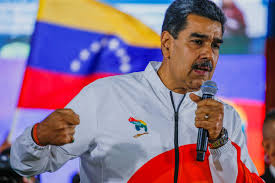
Venezuela’s Bluff: A Strategic Move in the Essequibo Dispute
Venezuela’s claim over the Essequibo region of Guyana has long been a point of contention between the two nations. With the international community largely recognizing Guyana’s sovereignty over the region, Venezuela has increasingly adopted a confrontational approach in its efforts to exert influence over
the disputed territory. Recently, Venezuela has threatened to take action regarding the upcoming elections in Essequibo, particularly in the context of Guyana’s ongoing electoral process in the disputed region. This move has been labeled as a bluff by Guyana’s Territorial
National Committee (TNC), which believes that Venezuela’s actions are meant to create confusion and stir international sympathy, rather than a genuine attempt to disrupt the elections.
The political and economic dynamics between Venezuela and Guyana are deeply influenced by the historical background of the Essequibo dispute. The region, rich in natural resources such as oil and gas, has long been seen by Venezuela as part of its territory, despite the 1899 arbitral award that determined it to be
Guyana’s sovereign land. In recent years, the discovery of significant oil reserves off the coast of Essequibo has made the region even more strategically important, increasing tensions between the two countries. Venezuela’s aggressive rhetoric, including its claim to intervene in the upcoming elections, is seen as part of a broader attempt to reassert its influence over the region.
Venezuela’s threats of interference in the Essequibo elections are viewed by many as a form of political posturing, aimed at strengthening domestic support amidst its ongoing political and economic crises. By presenting itself as the protector of Venezuelan interests in the region, the government of
Nicolás Maduro may seek to rally nationalistic sentiment, deflect attention from its internal problems, and garner support from its military and nationalist factions. The TNC, which represents Guyana’s interests in matters related to the dispute, has dismissed these threats as a mere bluff. According to the TNC, Venezuela has neither the capability nor the political will to meaningfully disrupt the elections or challenge Guyana’s sovereignty in the region.
The TNC’s Stance: Rejecting Venezuela’s Claims and Upholding Guyana’s Sovereignty
The Territorial National Committee of Guyana (TNC) has consistently been vocal in rejecting Venezuela’s claims to Essequibo, emphasizing the legitimacy of Guyana’s sovereignty over the region. The TNC has argued that Venezuela’s latest actions, including the rhetoric surrounding the Essequibo elections, are part of a larger strategy to undermine Guyana’s
political stability and international standing. According to the TNC, the Venezuelan government is relying on bluster and aggressive diplomacy to challenge the status quo, without presenting a viable threat to Guyana’s territorial integrity.
The TNC contends that Venezuela’s actions are purely symbolic, aimed at maintaining its claim over Essequibo in the face of diminishing support both domestically and internationally. Venezuela has failed to garner significant backing from other nations in its territorial dispute with Guyana, and its attempts to disrupt the electoral process are seen as futile efforts to
keep its claim alive. The TNC points to the fact that the United Nations, the International Court of Justice (ICJ), and many other international bodies have reaffirmed Guyana’s sovereignty over Essequibo, making Venezuela’s claims increasingly isolated and without merit.
Moreover, the TNC highlights the fact that the people of Essequibo have consistently expressed their desire to remain part of Guyana, which further undermines Venezuela’s position. The region’s residents, who enjoy the benefits of
being part of an internationally recognized sovereign state, have little to gain from aligning with Venezuela, particularly given the country’s ongoing economic and political instability. The TNC argues that any attempt by Venezuela to interfere with the democratic process in Essequibo would be met with firm resistance from both the people of Guyana and the international community.
In conclusion, while Venezuela’s claims over Essequibo remain a source of tension between the two nations, the current rhetoric surrounding the upcoming elections appears to be more of a bluff than a genuine threat. Guyana’s TNC remains confident that Venezuela’s actions are designed to project
strength and influence, rather than a serious attempt to challenge Guyana’s sovereignty. As international recognition of Guyana’s territorial integrity continues to grow, the likelihood of Venezuela successfully disrupting the elections or achieving its territorial aims in Essequibo remains exceedingly low.
Leave a Reply